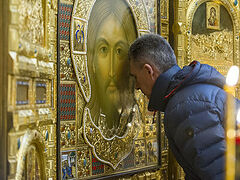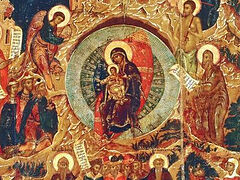It happened during Soviet times. The doctors tried to persuade their patient to interrupt her pregnancy due to an existing medical condition and age. The Most Holy Mother of God miraculously protected this woman from committing a grave sin. This story’s main character became a caring mother and later, after a difficult road to salvation, a believer.
Natalia was born with congenital heart disease. She got married immediately after graduating from the university with a degree in Economics. She, as well as her husband, dreamed about becoming parents. But then, a few years into her marriage, she was diagnosed with infertility.
At thirty-five, when they stopped dreaming and even avoided any conversations about having children, she found out that she was at long last going to become a mother. The couple was besotted with the news, which renewed their hopes of parenthood and family happiness.
But the doctors told Natalia that due to her age and existing heart problem she would have to have an abortion.
“Why would you, a pretty and well-educated lady, want to have a sick child? Besides, you would be lucky to even survive labor! Your heart defect is no joke. The conditions are such that even a healthy woman would be advised against having a baby beyond thirty-five years of age. You’ve got nothing but contraindications: your heart condition, this being your first pregnancy, plus your age. Make up your mind while you are still early in your pregnancy. It will be too late once you’re past twelve weeks…
It happened at the end of the 1970s when many women considered abortion as simply another “medical procedure.”
The doctors managed to talk Natalia into it and issued a certification for abortion.
The next morning she was on her way to the hospital. She was carrying a bag full of hospital necessities: a nightgown and a robe, slippers, toothpaste with a toothbrush, and a book. Tears flowed freely as Natalia kept on walking: “Why did it happen to me? What for? We were so desperate to have children!”
She came upon a road crossing. Absorbed in her thoughts and unaware of the busy road or the red lights ahead, she stepped towards a passing car that was about to run her over. Suddenly, someone grabbed her by hand and pushed back to the sidewalk. The disaster was avoided.
Natalia turned around: standing next to her was a woman she never met before wearing long trench coat and a beautiful headdress.
“Don’t go to the hospital, don’t do that. You asked for a baby and you will deliver a baby boy. It will be difficult at times but you will manage it!” said the passerby warmly.
Natalia wanted to ask this strange woman how she knew so much about her or where she had found out about the abortion referral or her desire to have a child. But the mysterious lady had vanished. Natalia thought that she may not have even seen or talked to anyone. Besides, other frightened pedestrians were circling around her.
“You’d better watch out next time, ma’am! You jumped as if from under the car. Are you into sports or something?”
Natalia smiled sadly:
“I wish! All I can do is having a quiet walk, but only if I stop here and there for rest. I can’t even deliver a healthy baby… “
The woman had made up her mind to disobey the doctors, and so she turned around and walked back home. Her mood instantly brightened and she started to make a mental list of things she needed to buy for her baby, planning where to put his crib and playpen… The future mom walked up to the mirror and was pleasantly surprised: she looked younger, the fine wrinkles had smoothed out, and her lips, usually bluish, turned pink. “Maybe we can fight a little longer!”, she said to herself.
At her next prenatal appointment, the ob-gyn team chastised her in an attempt to bring her “back to senses”, telling her about all those unfortunate cases of children born with defects and tragic labor experiences among older mothers. They blamed her refusal to have an abortion on raging pregnancy hormones and that her body was going through adjustment mentally and physically. They said that had gone crazy, so to speak. The doctor and nurse spoke with trepidation about how children born of mothers with congenital heart disease don’t live long, and suffer greatly at that.
As soon as the thought crossed Natalia’s mind that they sincerely care about her health or that she needs to follow their advice, an image of the unknown lady with the kind voice came back to her: “Who knows if that woman was really there. What if I am simply taking our long-held wish to be parents for reality (didn’t we dream about it for so long?). But all of this paled compared to something else: I could have been run over by a car and died, my baby dying along with me. What if it was a warning from above that I shouldn’t do it?”
The would-be mom took a deep breath for courage and then firmly replied to her doctor:
“Do whatever you like, but I am going to have this baby!”
A boy was born, weak, weighing less than three kilos, with bluish fingernails, failing to give his first cry upon delivery. The doctors were heard talking quietly:
“A goner, but we’ve got no choice—we’ll have to help him live.”
Natalia stayed at the hospital for almost a month as the health of her baby as well as her own had to be monitored daily by the specialists.
When her husband came to take his family home, he was “gently” informed that they would be lucky if the baby lived to twelve months.
Natalia lovingly and patiently cared for her son Grisha—she massaged his fingers and toes, nursed him, let him have air baths, and sang lullabies at bedtime.
Rain or shine, she would take him out for long walks adding:
“Take deep breaths of fresh air my baby, grow stronger and bigger, just don’t give up on us and never leave us alone, because we love you so much!”
Grisha was often sick and remained ill for a long time. Once when he was two he had a fever spiking up to 40C without dropping. He was admitted to the ICU. The doctors voiced a dismal prognosis. Natalia and her husband pleaded with the doctors to allow them to stay at the ICU for at least for a few moments to hold their dearest boy by the hand and say their last goodbyes.
“All I want is to have one last look at him while he is still alive to have it etched in my memory forever,” she cried, trying to persuade them. “I don’t want to lose him, I love him so much. He is so small and helpless, like soft grass in the wind. Why can’t anyone help him?”
Their boy’s life was miraculously saved.
Once as she went for stroll in a park nearby, she met an elderly lady.
“Honey you should baptize him. Pray before the icon of the Most Holy Mother of God and She will help you, never allowing the worst to happen.”
Natalia had been baptized Orthodox but was never a believer. Still, she went to a church that remained open during the Soviet times and spoke with a priest there. Grisha was baptized. She sewed his baptismal gown and the receiving blanket herself. During the ceremony, Grisha neither cried nor got fussy; he didn’t wander off but calmly listened to all the prayers.
Keeping in mind the advice she received from the elderly lady, Natalia asked a choir member to take her to the icon of the Most Holy Mother of God. She didn’t know how to pray and, lowering her head, she just stood there ashamed to raise her eyes and look at the icon, repeating simply: “Help him live and may he grow up to be a happy, clever, and kind-hearted man.”
A parishioner tried to comfort Natalia:
“Go ahead and cry, don’t be afraid of your tears. Make the sign of the cross.”
Upon hearing this, Natalia lifted her eyes and then froze: the icon bore the image of that same woman who saved her and her baby. She performed two miracles—saving her from being run over by a car, and from having an abortion.
Natalia dropped to her knees before the icon:
“Mother of God, thank you, my heartfelt thanks to your Son!”
Her boy grew older. Sure, he was weak and sickly: allergies, diathesis, learning to walk later than other boys his age—plus he was officially considered disabled.
But the woman wouldn’t cry or fear anything any longer whenever she was ruefully told time and again, be it at the hospital or the doctor’s office, that her son wouldn’t live to be five, then ten, and so on. Every time she heard it she would just smile and say to herself: “It’s all going to be fine, God is with us, I will pray to Him, to His Most Holy Mother and His saints!”
Her husband joined her at church services, they went to confession regularly and received communion. They never questioned whether God exists, or if there is justice in the world. They knew that the Church of Christ holds the key to power, peace, and truth. That’s where one should seek protection and mercy.
As their son was growing older, he became a straight “A” student at school, being a natural learner. Besides, he knew who he should be in the future—he dreamed of working as a biologist from early childhood. When the young man finished school with distinction and entered the Biology Department of the Moscow State University, everyone in the family arranged for a prayer service of thanksgiving to the Savior to be served at church and dedicated time at home to read the akathist to the Most Holy Mother of God.
When Grisha was at post-graduate school, Natalia ran into her former doctor. Having learned about his former patient and his successful life, he genuinely expressed delight at the news:
“It is a miracle that proves how a mother’s love and faith is stronger than illness or death. I am glad you didn’t have an abortion…”
Gregory, a Doctor of Biology (Ph.D.), is now forty-one; he is often invited to read lectures at universities across Russia and Europe. Anywhere he goes, be it on a business trip or other travels, he always finds a local Orthodox Church. Grisha remembers from childhood and since the day of his baptism that the church is the father’s house. Love and mercy reside there.




